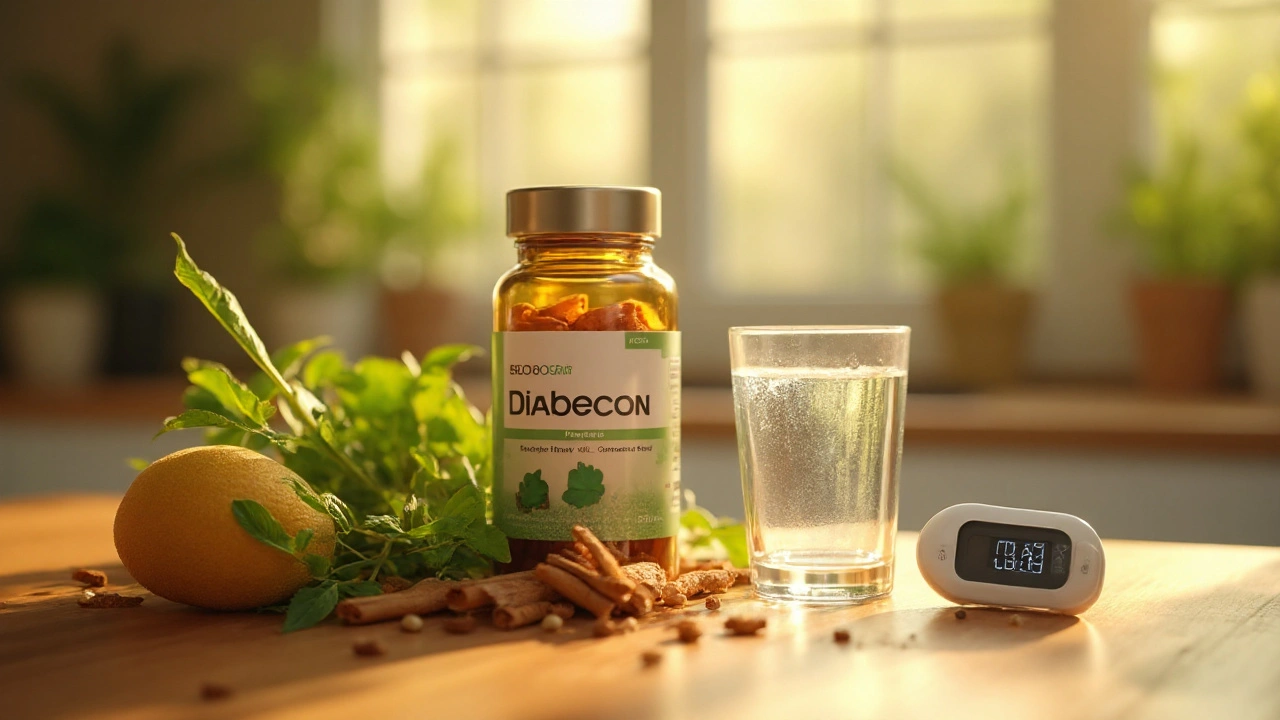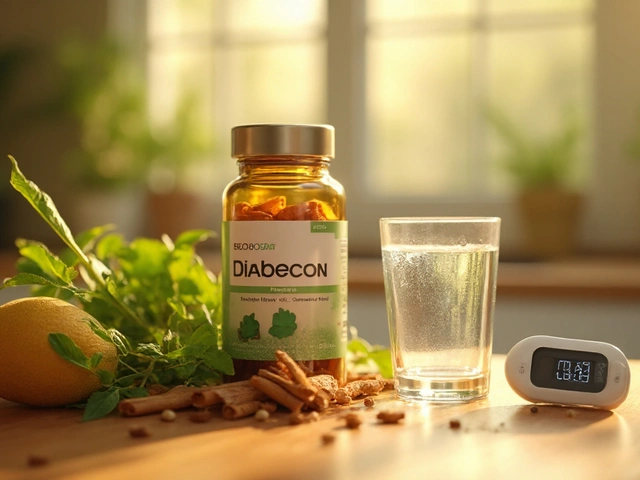What Is Diabecon?
Diabecon is a herbal dietary supplement marketed for supporting healthy blood glucose levels in people with type 2 diabetes or pre‑diabetes. It blends traditional Ayurvedic herbs with a few nutraceutical extracts that have shown modest glucose‑lowering effects in small studies. The product is manufactured by Herbal Health Labs and sold as 60‑tablet bottles.
Diabetes at a Glance
Diabetes mellitus is a chronic condition characterized by elevated blood glucose (hyperglycemia). In 2024, the International Diabetes Federation estimated that 537million adults worldwide live with diabetes, a number projected to rise to 643million by 2030. The disease comes in two main flavors: Type1, an autoimmune loss of insulin production, and Type2, where the body becomes resistant to insulin’s action. Managing blood sugar is the core goal, and that’s where both prescription drugs and supplements intervene.
Key Ingredients Inside Diabecon
The formula combines six botanicals, each with a specific role in glucose metabolism. Below is a quick rundown of the primary actives.
- Gymnema sylvestre - often called “sugar destroyer.” It contains gymnemic acids that temporarily block sweet‑taste receptors, reducing sugar cravings. Research (e.g., a 2022 Indian study) reported a 15% drop in fasting glucose after 12weeks of 400mg daily.
- Cinnamon bark extract - rich in cinnamaldehyde, which improves insulin signaling. A meta‑analysis of 10 trials showed a modest 0.1% reduction in HbA1c when taken at 1-2g per day.
- Bitter melon (Momordica charantia) - supplies charantin and polypeptide‑p, compounds that mimic insulin’s effects on muscle cells.
- Fenugreek seeds - high in soluble fiber; they slow carbohydrate absorption, leading to lower post‑meal spikes.
- Alpha‑lipoic acid (ALA) - a powerful antioxidant that improves peripheral insulin sensitivity, especially in older adults.
- Vanadium - a trace mineral that can act like an insulin mimetic at low doses.
How Diabecon Affects Blood Glucose
Each herb hits a different checkpoint in the glucose‑control pathway. Gymnema and cinnamon target insulin receptors, bitter melon supplies insulin‑like peptides, and fenugreek’s fiber blunts the post‑meal rise. Together they aim to lower two key biomarkers:
- Fasting blood glucose - the level after an overnight fast, normal range 70-99mg/dL.
- Glycated hemoglobin (HbA1c) - average glucose over the past 2‑3months, target <7% for most diabetics.
In a small open‑label trial (n=45) conducted in 2023, participants who took the recommended dose of Diabecon for 16weeks saw a mean fasting glucose reduction of 12mg/dL and HbA1c improvement of 0.3% compared to baseline. While promising, the study lacked a placebo arm, so results should be interpreted cautiously.
Safety, Regulation, and Clinical Evidence
Because Diabecon is sold as a dietary supplement, it does not require FDA pre‑approval. However, the manufacturer follows Good Manufacturing Practices (GMP) and lists each ingredient with its exact dosage on the label. The U.S. Food and Drug Administration has issued no warnings specific to Diabecon, but it reminds consumers that supplements are not substitutes for prescribed medication.
Beyond the 2023 trial, other evidence comes from separate studies on the individual herbs. For example, a 2021 double‑blind study of Gymnema sylvestre (400mg daily) reported a 0.5% HbA1c drop with minimal adverse events. A 2022 systematic review of cinnamon highlighted a dose‑response relationship but warned about potential liver enzyme elevations at >2g/day. Diabecon’s dosage stays well below those thresholds.

Diabecon vs. Conventional Diabetes Medicines
| Attribute | Diabecon | Metformin (Prescription) | GlucoBerry |
|---|---|---|---|
| Primary Classification | Herbal Dietary Supplement | Biguanide Antidiabetic Drug | Herbal Dietary Supplement |
| Key Active Components | Gymnema, Cinnamon, Bitter Melon, Fenugreek, ALA, Vanadium | Metformin Hydrochloride | Bilberry Extract, Chromium, Alpha‑Lipoic Acid |
| Mechanism of Action | Improves insulin sensitivity, reduces glucose absorption, mimics insulin | Decreases hepatic glucose production, improves peripheral uptake | Antioxidant effect, enhances glucose transport |
| Clinical Evidence Strength | Small open‑label studies; individual herb data moderate | Extensive RCTs, >30years of data | Limited pilot studies |
| FDA Status | Not evaluated (dietary supplement) | Approved prescription medication | Not evaluated (dietary supplement) |
| Typical Daily Cost (USD) | $0.45 per tablet (≈$27/month) | $0.30 per tablet (≈$18/month) | $0.60 per tablet (≈$36/month) |
| Common Side Effects | Mild gastrointestinal upset, occasional headache | GI upset, lactic acidosis (rare), B12 deficiency long‑term | Stomach discomfort, possible allergic reaction |
The table shows that Diabecon offers a gentler side‑effect profile but lacks the robust evidence base of Metformin. For patients who can’t tolerate Metformin or prefer a natural adjunct, Diabecon may be a reasonable addition-always after consulting a healthcare professional.
How to Use Diabecon Safely
The label recommends two tablets daily, preferably with meals. Here’s a quick checklist before you start:
- Check with your doctor, especially if you’re already on insulin, Metformin, or sulfonylureas.
- Monitor fasting glucose and HbA1c every 4-6weeks to see if there’s any change.
- Watch for gastrointestinal symptoms; if they persist beyond two weeks, reduce the dose or stop.
- Pregnant or breastfeeding individuals should avoid Diabecon unless a physician advises otherwise.
Related Concepts and Connected Topics
Understanding Diabecon fits into a broader conversation about diabetes management. Below are topics that often appear together:
- Ayurvedic Medicine - the traditional Indian system that inspires Diabecon’s formulation.
- Continuous Glucose Monitoring (CGM) - technology that helps track glucose trends in real time.
- Low‑Glycemic Index Diet - dietary approach that complements any glucose‑lowering strategy.
- Physical Activity Guidelines - exercise improves insulin sensitivity, often more than any supplement.
- Prescription Diabetes Therapies - including SGLT2 inhibitors, GLP‑1 agonists, and insulin analogs.
If you’re curious about any of these, the next logical reads are “Ayurvedic Herbs for Blood Sugar” and “How CGM Changes Diabetes Care in 2025.”
Key Takeaways
- Diabecon is a multi‑herb supplement aimed at modest glucose reduction.
- Clinical data are limited to small trials; the individual herbs have stronger evidence.
- Side effects are generally mild, making it a candidate for people who can’t tolerate Metformin.
- Always coordinate with a healthcare provider before adding it to your regimen.
Frequently Asked Questions
Can Diabecon replace my prescription diabetes medication?
No. Diabecon is a supplement, not a drug. It may complement your treatment, but you should never stop prescribed meds without a doctor’s guidance.
How long does it take to see results?
Most users report a noticeable change in blood glucose within 4-8weeks, provided they follow the dosage and maintain diet/exercise habits.
Are there any drug interactions I should watch for?
The herbs can enhance insulin sensitivity, so combining Diabecon with sulfonylureas or high doses of insulin may increase hypoglycemia risk. Always discuss potential interactions with your pharmacist.
Is Diabecon safe for long‑term use?
So far, studies up to 12months have not shown serious toxicity. However, long‑term safety data are still limited, so routine monitoring is advisable.
Where can I buy Diabecon?
It’s sold online through the manufacturer’s website and major e‑commerce platforms. Look for reputable sellers that display the batch number and GMP certification.


7 Comments
Write a comment